 Libri di David Blamey su Unilibro.it
)
Libri di David Blamey su Unilibro.it
)
|
|
2025 |
 Title :
Bands
Title :
BandsAuthor: Blamey David Publisher: VEII € 40,00
|
|
|
1918 |
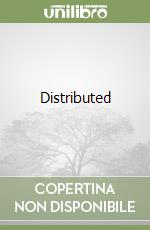 Title :
Distributed
Title :
DistributedAuthor: Blamey David (EDT), Haylock Brad (EDT) Publisher: Open Editions € 32,30
|
|
|
1916 |
 Title :
Specialism
Title :
SpecialismAuthor: Blamey David (EDT), Poyner Rick (CON) Publisher: Open Editions € 31,20
|
|
|
2006 |
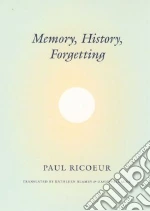 Title :
Memory, History, Forgetting
Title :
Memory, History, ForgettingAuthor: Ricoeur Paul, Blamey Kathleen (TRN), Pellauer David (TRN) Publisher: Univ of Chicago Pr Why do major historical events such as the Holocaust occupy the forefront of the collective consciousness, while profound moments such as the Armenian genocide, the McCarthy era, and France's role in North Africa stand distantly behind? Is it possible that history 'overly remembers' some events at the expense of others? A landmark work in philosophy, Paul Ricoeur's Memory, History, Forgetting examines this reciprocal relationship between remembering and forgetting, showing how it affects both the perception of historical experience and the production of historical narrative. Memory, History, Forgetting, like its title, is divided into three major sections. Ricoeur first takes a phenomenological approach to memory and mnemonical devices. The underlying question here is how a memory of present can be of something absent, the past. The second section addresses recent work by historians by reopening the question of the nature and truth of historical knowledge. Ricoeur explores whether historians, who can write a history of memory, can truly break with all dependence on memory, including memories that resist representation. The third and final section is a profound meditation on the necessity of forgetting as a condition for the possibility of remembering, and whether there can be something like happy forgetting in parallel to happy memory. Throughout the book there are careful and close readings of the texts of Aristotle and Plato, of Descartes and Kant, and of Halbwachs and Pierre Nora. A momentous achievement in the career of one of the most significant philosophers of our age, Memory, History, Forgetting provides the crucial link between Ricoeur's Time and Narrative and Oneself as Another and his recent reflections on ethics and the problems of responsibility and representation. “His success in revealing the internal relations between recalling and forgetting, and how this dynamic becomes problematic in light of events once present but now past, will inspire academic dialogue and response but also holds great appeal to educated general readers in search of both method for and insight from considering the ethical ramifications of modern events. . . . It is indeed a master work, not only in Ricoeur's own vita but also in contemporary European philosophy.”—Library Journal “Ricoeur writes the best kind of philosophy—critical, economical, and clear.”— New York Times Book Review € 34,00
|
|
|
1990 |
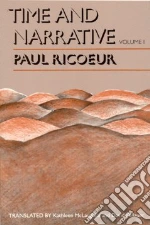 Title :
Time and Narrative
Title :
Time and NarrativeAuthor: Ricoeur Paul, Blamey Kathleen, Pellauer David (TRN) Publisher: Univ of Chicago Pr Time and Narrative builds on Paul Ricoeur's earlier analysis, in The Rule of Metaphor, of semantic innovation at the level of the sentence. Ricoeur here examines the creation of meaning at the textual level, with narrative rather than metaphor as the ruling concern. Ricoeur finds a 'healthy circle' between time and narrative: time is humanized to the extent that it portrays temporal experience. Ricoeur proposes a theoretical model of this circle using Augustine's theory of time and Aristotle's theory of plot and, further, develops an original thesis of the mimetic function of narrative. He concludes with a comprehensive survey and critique of modern discussions of historical knowledge, understanding, and writing from Aron and Mandelbaum in the late 1930s to the work of the Annales school and that of Anglophone philosophers of history of the 1960s and 1970s. 'This work, in my view, puts the whole problem of narrative, not to mention philosophy of history, on a new and higher plane of discussion.'—Hayden White, History and Theory 'Superb. . . . A fine point of entrance into the work of one of the eminent thinkers of the present intellectual age.'—Joseph R. Gusfield, Contemporary Sociology € 18,70
|
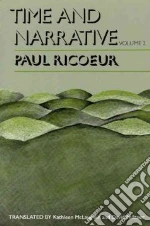 Title :
Time and Narrative
Title :
Time and NarrativeAuthor: Ricoeur Paul, Blamey Kathleen, Pellauer David (TRN) Publisher: Univ of Chicago Pr In volume 1 of this three-volume work, Paul Ricoeur examined the relations between time and narrative in historical writing. Now, in volume 2, he examines these relations in fiction and theories of literature. Ricoeur treats the question of just how far the Aristotelian concept of 'plot' in narrative fiction can be expanded and whether there is a point at which narrative fiction as a literary form not only blurs at the edges but ceases to exist at all. Though some semiotic theorists have proposed all fiction can be reduced to an atemporal structure, Ricoeur argues that fiction depends on the reader's understanding of narrative traditions, which do evolve but necessarily include a temporal dimension. He looks at how time is actually expressed in narrative fiction, particularly through use of tenses, point of view, and voice. He applies this approach to three books that are, in a sense, tales about time: Virgina Woolf's Mrs. Dalloway; Thomas Mann's Magic Mountain; and Marcel Proust's Remembrance of Things Past. 'Ricoeur writes the best kind of philosophy—critical, economical, and clear.'—Eugen Weber, New York Times Book Review 'A major work of literary theory and criticism under the aegis of philosophical hermenutics. I believe that . . . it will come to have an impact greater than that of Gadamer's Truth and Method—a work it both supplements and transcends in its contribution to our understanding of the meaning of texts and their relationship to the world.'—Robert Detweiler, Religion and Literature 'One cannot fail to be impressed by Ricoeur's encyclopedic knowledge of the subject under consideration. . . . To students of rhetoric, the importance of Time and Narrative . . . is all too evident to require extensive elaboration.'—Dilip Parameshwar Gaonkar, Quarterly Journal of Speech € 17,90
|
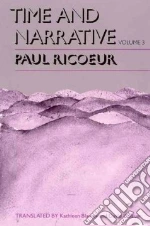 Title :
Time and Narrative
Title :
Time and NarrativeAuthor: Ricoeur Paul, Blamey Kathleen, Pellauer David (TRN) Publisher: Univ of Chicago Pr In the first two volumes of this work, Paul Ricoeur examined the relations between time and narrative in historical writing, fiction, and theories of literature. This final volume, a comprehensive reexamination and synthesis of the ideas developed in volumes 1 and 2, stands as Ricoeur's most complete and satisfying presentation of his own philosophy. Ricoeur's aim here is to explicate as fully as possible the hypothesis that has governed his inquiry, namely, that the effort of thinking at work in every narrative configuration is completed in a refiguration of temporal experience. To this end, he sets himself the central task of determing how far a poetics of narrative can be said to resolve the 'aporias'—the doubtful or problematic elements—of time. Chief among these aporias are the conflicts between the phenomenological sense of time (that experienced or lived by the individual) and the cosmological sense (that described by history and physics) on the one hand and the oneness or unitary nature of time on the other. In conclusion, Ricoeur reflects upon the inscrutability of time itself and attempts to discern the limits of his own examination of narrative discourse. 'As in his previous works, Ricoeur labors as an imcomparable mediator of often estranged philosophical approaches, always in a manner that compromises neither rigor nor creativity.'—Mark Kline Taylor, Christian Century 'In the midst of two opposing contemporary options—either to flee into ever more precious readings . . . or to retreat into ever more safe readings . . . —Ricoeur's work offers an alternative option that is critical, wide-ranging, and conducive to new applications.'—Mary Gerhart, Journal of Religion € 25,00
|